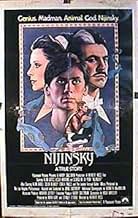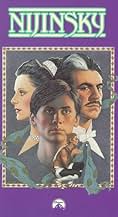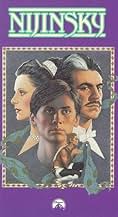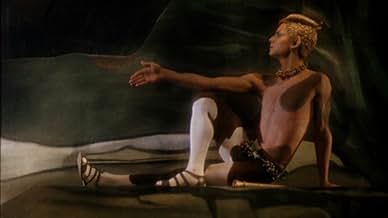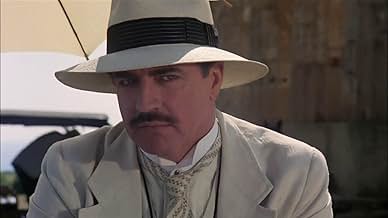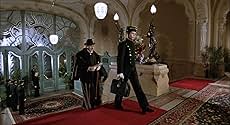AVALIAÇÃO DA IMDb
6,5/10
878
SUA AVALIAÇÃO
Adicionar um enredo no seu idiomaThe story of Vaslav Nijinsky, who is widely believed to be one of the greatest ballet dancers of all time. Based on Romola Nijinsky's "Last Years Of Nijinski.The story of Vaslav Nijinsky, who is widely believed to be one of the greatest ballet dancers of all time. Based on Romola Nijinsky's "Last Years Of Nijinski.The story of Vaslav Nijinsky, who is widely believed to be one of the greatest ballet dancers of all time. Based on Romola Nijinsky's "Last Years Of Nijinski.
- Direção
- Roteiristas
- Artistas
Tomaso Milian Jr.
- Young Boy on Beach
- (as Tomas Milian Jr)
- Direção
- Roteiristas
- Elenco e equipe completos
- Produção, bilheteria e muito mais no IMDbPro
Avaliações em destaque
I consider this film a failure. It fails at being a good biopic about Nijinsky, as the facts are far too skewed in this telling. Part of this is because source material was sorely limited at the time, but it doesn't even match up with what was available. It fails at being a dance movie, as what little ballet is shown is unfortunately not filmed very well, with the worst offense being a choppy slow motion effect that ruins the climactic leap at the end of Spectre of the Rose. I can't fathom why the director, a former choreographer, would make such a stupid choice.
Those of you saying this film was "brave" for attempting to portray a gay romance on screen in 1980 - did we watch the same movie? The only kiss between two men in this involves a goofy and obvious gimmick with a tissue to avoid censorship, and besides that the relationship between the real Diaghilev and Nijinsky was far from romantic. It was an exploitative business transaction that quickly soured when Nijinsky decided to marry.
The film tries to cover a period of ten years in just two hours, which leads to idiotic insinuations, such as Nijinsky going mad because he sexually repressed himself, or because his brother was "insane" . The man was a schizophrenic; nothing specific actually caused his illness. The stress of not being able to find work after Diaghilev fired him for marrying Romola likely did exacerbate it along with other factors. But the fact remains that he was married to her for five years and had a child by her before he was institutionalized; saying he went crazy because of their marriage is ridiculous.
Okay, I'll throw the non-history buffs a bone. I know that most biopics play fast and loose with the truth, but this movie is just not good or enjoyable to watch even as a piece of entertainment. The acting is often melodramatic to the point of being cringe-worthy. Alan Bates as Diaghilev is good, but George de la Pena and Leslie Browne are very poorly cast as an overwrought Nijinsky and simpering Romola. The script contains a lot of really dumb moments (I laughed hysterically during the film's only "sex scene" which is soundtracked with Stravinsky's The Rite of Spring, as well as the cabin-trashing scene that is reminiscent of Tommy Wiseau's The Room), scenes which don't make a whole lot of sense, and throwaway lines which don't factor into the plot or mean anything later. Nijinsky kisses his female ballet partner (who is presented as an amalgam fulfilling the roles his partner Tamara Karsavina and his sister Bronia filled in real life) on the lips, and I guess it's supposed to be our first sign that he is trying to rebel against his nature and Diaghilev, but the scene ends awkwardly and nothing actually comes of it. So what was the point of the scene?
If you are curious about Nijinsky and the Ballet Russes and really want to see a movie version, go watch the BBC production Riot at the Rite - it's free on YouTube. Otherwise, this movie is pretty much irrelevant and I can't recommend it.
Those of you saying this film was "brave" for attempting to portray a gay romance on screen in 1980 - did we watch the same movie? The only kiss between two men in this involves a goofy and obvious gimmick with a tissue to avoid censorship, and besides that the relationship between the real Diaghilev and Nijinsky was far from romantic. It was an exploitative business transaction that quickly soured when Nijinsky decided to marry.
The film tries to cover a period of ten years in just two hours, which leads to idiotic insinuations, such as Nijinsky going mad because he sexually repressed himself, or because his brother was "insane" . The man was a schizophrenic; nothing specific actually caused his illness. The stress of not being able to find work after Diaghilev fired him for marrying Romola likely did exacerbate it along with other factors. But the fact remains that he was married to her for five years and had a child by her before he was institutionalized; saying he went crazy because of their marriage is ridiculous.
Okay, I'll throw the non-history buffs a bone. I know that most biopics play fast and loose with the truth, but this movie is just not good or enjoyable to watch even as a piece of entertainment. The acting is often melodramatic to the point of being cringe-worthy. Alan Bates as Diaghilev is good, but George de la Pena and Leslie Browne are very poorly cast as an overwrought Nijinsky and simpering Romola. The script contains a lot of really dumb moments (I laughed hysterically during the film's only "sex scene" which is soundtracked with Stravinsky's The Rite of Spring, as well as the cabin-trashing scene that is reminiscent of Tommy Wiseau's The Room), scenes which don't make a whole lot of sense, and throwaway lines which don't factor into the plot or mean anything later. Nijinsky kisses his female ballet partner (who is presented as an amalgam fulfilling the roles his partner Tamara Karsavina and his sister Bronia filled in real life) on the lips, and I guess it's supposed to be our first sign that he is trying to rebel against his nature and Diaghilev, but the scene ends awkwardly and nothing actually comes of it. So what was the point of the scene?
If you are curious about Nijinsky and the Ballet Russes and really want to see a movie version, go watch the BBC production Riot at the Rite - it's free on YouTube. Otherwise, this movie is pretty much irrelevant and I can't recommend it.
Whatever the facts may have been, the screenplay writers here have chosen to interpret the end of Nijinsky's dazzling career and his descent into madness, as being caused by the end of his romantic relationship with Diaghilev. An interesting premise - that what appeared to most people to be a simple case of a "dirty old man" exploiting a young man's ambition (or perhaps an ambitious young man exploiting an older man's lust), was in fact a genuine love affair. They weren't using each other, they genuinely loved each other.
Sadly, in 1980, it appears the film-makers were not brave enough to explore this fully enough for the film to work. The characters talk about passion a lot, but we don't see it much. Indeed the only love scene between the two men involves a couple of little kisses with a handkerchief held to their lips! How wonderful it would have been to see these two men genuinely passionate with each other - physically and spiritually - and how they managed to turn that passion into great works of art. This way we could understand Nijinsky's devastation when Diaghilev rejects him. As it stands, it seems to come from nowhere.
This is no fault of the actors. Both Alan Bates and George De La Pena do what they can, with the scenes that they have. What a shame the film wasn't made a few years later, when gay relationships could be explored on screen more completely. This could have been one hell of a film. As it is, the ballet reconstructions are excellent and the costumes superb. Performances are strong, with the possible exception of Leslie Browne, who is a little out of her depth here as the scheming rich girl chasing Nijinsky. She fared much better in Herbert Ross' earlier ballet film THE TURNING POINT.
Herbert Ross was a terrific choice to direct the film, having been a professional ballet director and choreographer, and the film has a superb sense of period and great style. But the heart is missing. The racing heartbeats of two men, and two great artists, madly in love.
Sadly, in 1980, it appears the film-makers were not brave enough to explore this fully enough for the film to work. The characters talk about passion a lot, but we don't see it much. Indeed the only love scene between the two men involves a couple of little kisses with a handkerchief held to their lips! How wonderful it would have been to see these two men genuinely passionate with each other - physically and spiritually - and how they managed to turn that passion into great works of art. This way we could understand Nijinsky's devastation when Diaghilev rejects him. As it stands, it seems to come from nowhere.
This is no fault of the actors. Both Alan Bates and George De La Pena do what they can, with the scenes that they have. What a shame the film wasn't made a few years later, when gay relationships could be explored on screen more completely. This could have been one hell of a film. As it is, the ballet reconstructions are excellent and the costumes superb. Performances are strong, with the possible exception of Leslie Browne, who is a little out of her depth here as the scheming rich girl chasing Nijinsky. She fared much better in Herbert Ross' earlier ballet film THE TURNING POINT.
Herbert Ross was a terrific choice to direct the film, having been a professional ballet director and choreographer, and the film has a superb sense of period and great style. But the heart is missing. The racing heartbeats of two men, and two great artists, madly in love.
The film was made shortly after the death of Romola Nijinskaya, the wife of the legendary dancer, as if the producers just had waited for her death to be able to make the film. It is very carefully done, sticking meticulously to the well documented case as it was lovingly presented by his wife herself in her two books about her famous husband. It's a sad story, of course, if not even like a Greek tragedy, and the film admirably tries to embrace and make the tragedy conceivable, by going into details about the passions of Diaghilev, Nijinsky, Fokine, the lovely Karsavina (the most sympathetic of them all) and Romola. But the chief asset of the film is the great acting by them all, including Ronald Pickup as Stravinsky ('a very dry man' according to Nijinsky, who didn't like him at all,) Alan Badel at his best as the Baron Ginzburg, Jeremy Irons as Fokine, the adorable Carla Fracci as Tamara Karsavina, and above all Alan Bates as a superb Diaghilev, quite human in all his necessary monstrosity as an impresario with too many eccentric characters under his wings, and George de la Pena as an almost painfully true and convincing Nijinsky. To this comes the wonderful ballet performances, including "The Spectre of the Rose" (Nijinsky's tour de force) and "The Afternoon of a Faun", the crucial turning point in his career from only dancer to controversial choreographer. Deserving the highest merit of all is the most admirable reconstruction of the ballets russes at that time with the fabulous art works of Leon Bakst, Diaghilev's unique scenographer, turning all Fokine's and Nijinsky's ballets into sumptuous living fairy tales of fantastic dancing, perhaps most clearly illustrated by Rimsky-Korsakov's "Sheheradzade", which music finally crowns the film in the end, which is needed, since, as I said, it's a sad story, but it couldn't have been made better. The only objection that would be relevant is the failure of making Nijinsky's lapse into madness credible. It was actually a long process, he wasn't definitely past hope until 1917 (4 years after the end of the film), and the main reason was not the crises of his relationships but the impact on him by the First World War. This important piece in the puzzle is missing in the film. Instead you see him ending up in a strait-jacket without further explanation.
It's a great film none the less, and as time goes by it will certainly win the acclaim it deserves as one of the great ballet film classics, second only to "The Red Shoes" 1948 and "The Specter of the Rose" 1946, which actually also is a masked portrait of Nijinsky (see my review of that film).
It's a great film none the less, and as time goes by it will certainly win the acclaim it deserves as one of the great ballet film classics, second only to "The Red Shoes" 1948 and "The Specter of the Rose" 1946, which actually also is a masked portrait of Nijinsky (see my review of that film).
This little-seen film by Herbert Ross chooses to focus on the rise and fall of Vaslav Nijinsky, petulant and superb dancer, and his stormy relationship with his producer-lover, Sergei Diaghilev. This story from with the heart of Ballet Russes has been well-documented before and here we see the descent into madness of a great, if unhinged artist.
George De La Pena plays the title role, and his dancing is a dream. Alan Bates is excellent as Diaghilev, all repressed passion and deep thoughts. The film tries its best to portray this unorthodox relationship with the ballet at its core, but doesn't quite get there - a sign of the times, perhaps? A strength of 'Nijinsky' is the dance sequences which are replicated as they would have originally been performed, right up to the scandalous performance of the Fawn piece. The scenes where the unhappy dancer is confined to an asylum have less power but are as valid as any other sequence in the film.
George De La Pena plays the title role, and his dancing is a dream. Alan Bates is excellent as Diaghilev, all repressed passion and deep thoughts. The film tries its best to portray this unorthodox relationship with the ballet at its core, but doesn't quite get there - a sign of the times, perhaps? A strength of 'Nijinsky' is the dance sequences which are replicated as they would have originally been performed, right up to the scandalous performance of the Fawn piece. The scenes where the unhappy dancer is confined to an asylum have less power but are as valid as any other sequence in the film.
If you, like me, are a Nijinsky fan, go ahead and watch it
But I have some complaints
The film is great, don't get me wrong, but I felt like it lacked more simple scenes between Diaghilev and Nijinsky More on why they fell in love How it all started They focus a lot on the consequences of this, but not on the reasons of why it happened in the first place
I mean,yeah,love doesn't have a reason to happen and blah blah blah But when we start the movie, they already like each other Personally, I found the film a bit massive, as it lacks lighthearted scenes
I understand that they chose to focus on the tragedy, but if they really showed the reason that made Nijinsky stay, the love between them, I believe the moment where it all falls apart would be even better I would also have liked to have seen a scene of Nijinsky protecting Diaghilev, in addition to just Diaghilev protecting him, and to show Nijinsky's reaction to this protection, too More physical and emotional intimacy beyond arguments
Furthermore, they did not mention anything about WWI, which was a big reason for Nijinsky's downfall, as he was considered an enemy as he was in Belgium, due to his Russian citizenship
Despite this, overall, the film is great The costumes are realistic, the performances, in my opinion, are great and they managed to demonstrate the consequences very well, even with the lack of reasons.
The film is great, don't get me wrong, but I felt like it lacked more simple scenes between Diaghilev and Nijinsky More on why they fell in love How it all started They focus a lot on the consequences of this, but not on the reasons of why it happened in the first place
I mean,yeah,love doesn't have a reason to happen and blah blah blah But when we start the movie, they already like each other Personally, I found the film a bit massive, as it lacks lighthearted scenes
I understand that they chose to focus on the tragedy, but if they really showed the reason that made Nijinsky stay, the love between them, I believe the moment where it all falls apart would be even better I would also have liked to have seen a scene of Nijinsky protecting Diaghilev, in addition to just Diaghilev protecting him, and to show Nijinsky's reaction to this protection, too More physical and emotional intimacy beyond arguments
Furthermore, they did not mention anything about WWI, which was a big reason for Nijinsky's downfall, as he was considered an enemy as he was in Belgium, due to his Russian citizenship
Despite this, overall, the film is great The costumes are realistic, the performances, in my opinion, are great and they managed to demonstrate the consequences very well, even with the lack of reasons.
Você sabia?
- CuriosidadesExecutive Producer Harry Saltzman had wanted to make a movie about Nijinsky for many years, first attempting to produce a version in 1970 with partner Albert R. Broccoli. The movie was started, but was never finished, it being cancelled by Broccoli and Saltzman. It is known as Nijinsky: Unfinished Project (1970). It starred Rudolf Nureyev, was written by Edward Albee, and directed by Tony Richardson.
Principais escolhas
Faça login para avaliar e ver a lista de recomendações personalizadas
- How long is Nijinsky?Fornecido pela Alexa
Detalhes
Bilheteria
- Faturamento bruto nos EUA e Canadá
- US$ 1.047.454
- Faturamento bruto mundial
- US$ 1.047.454
- Tempo de duração2 horas 9 minutos
- Cor
- Mixagem de som
- Proporção
- 1.85 : 1
Contribua para esta página
Sugerir uma alteração ou adicionar conteúdo ausente

Principal brecha
By what name was Nijinsky, uma História Real (1980) officially released in Canada in English?
Responda


